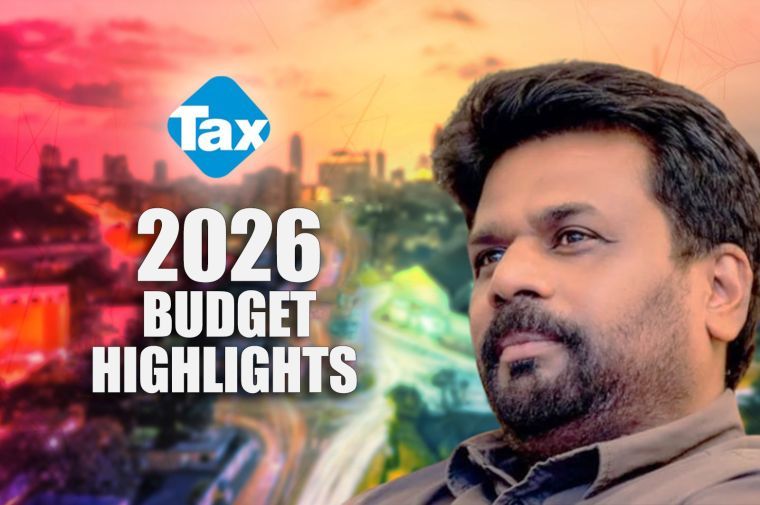President Anura Kumara Dissanayake, in his capacity as Finance Minister, presented Sri Lanka’s 80th National Budget today (07.11.2025) in Parliament. The key tax proposals have been summarized here for your reference.
Budget Highlights 2026

1: VAT and SSCL on Imported Coconut and Palm Oil
The government will remove the existing Special Commodity Levy on imported coconut oil and palm oil and instead apply VAT and SSCL from April 2026 to ensure equal tax treatment with locally produced oils.
Impact
This measure creates a level playing field for local producers and importers while increasing government revenue through a unified tax structure.
2: Reduction of VAT and SSCL Registration Threshold
To broaden the tax base, the annual turnover threshold for VAT and SSCL registration will be reduced from Rs. 60 million to Rs. 36 million, effective April 1, 2026.
Impact
This measure will bring more businesses into the tax net, improving revenue collection and ensuring greater compliance within the SME sector.
3: Removal of CESS and Imposition of VAT on Imported Fabric
To ensure fair competition, the CESS of Rs. 100 per kilogram on imported fabric will be removed, and VAT will be applied instead, effective April 1, 2026.
Impact
This change creates a level playing field between local fabric manufacturers and importers, while also enhancing government revenue through VAT collection.
4: Imposition of SSCL on Vehicles at Import or Manufacture
To ensure proper tax collection, the Social Security Contribution Levy (SSCL) on vehicles will be charged at the time of import or manufacture and sale, instead of during after-sales. This measure will take effect from April 2026.
Impact
This will improve compliance and transparency in vehicle taxation, ensuring better revenue collection while reducing opportunities for tax evasion in the automotive sector.
5: Implementation of the National Tariff Policy
The government will revise Customs Import Duty rates from the current 0%, 15%, and 20% to 0%, 10%, 20%, and 30%, effective April 2026, under the National Tariff Policy. A phased plan will also be introduced to gradually remove para-tariffs with minimal impact on revenue.
Impact
This policy aims to simplify the tariff structure, enhance trade competitiveness, and support economic growth while maintaining fiscal stability through a gradual transition.
6: Modernizing the Tax Audit Process
A modern tax audit framework will be introduced for returns filed from January 2026 to improve integrity, efficiency, and fairness in tax administration. Audit case selection will be based on transparent risk assessments by the Risk Management Unit, with oversight from a committee appointed by the Commissioner General of Inland Revenue.
Impact
The new framework will reduce corruption and discretion, promote transparency and accountability, and strengthen public trust in the tax system, supporting Sri Lanka’s move toward sustainable economic growth.
7: Amendments to Telecommunications Tax and Strengthening AML/CFT Framework
The Telecommunications Tax Act No. 21 of 2011 will be amended to include bad debts and recovered debts in the levy calculation for telecom service providers. In addition, new legal provisions will enable information sharing between tax authorities, the Financial Intelligence Unit, and other enforcement bodies to strengthen efforts against money laundering and terrorist financing.
Impact
These amendments will improve tax compliance in the telecommunications sector and enhance coordination among regulatory agencies. Strengthening the AML/CFT framework will reinforce Sri Lanka’s global reputation for financial integrity and transparency.
8: Development of the National Electronic Invoicing System
A national e-invoicing system will be launched using an API-based framework that connects taxpayers’ ERP systems with the Revenue Administration Management Information System (RAMIS). The rollout will begin this year with pilot companies, expanding in phases to export-oriented enterprises, all VAT-registered taxpayers, and eventually POS-based real-time transactions.
Impact
This system will enhance tax compliance, reduce fraud, and improve VAT administration through real-time transaction monitoring, increasing transparency and efficiency in revenue collection.
9: Establishment of a Unified Office for the Department of Inland Revenue
To enhance efficiency and taxpayer services, the government will establish a single office complex to house the Department of Inland Revenue and its related divisions. Rs. 2,000 million has been allocated for the project, following a feasibility study to determine the most suitable location.
Impact
Bringing all operations under one roof will streamline tax administration, improve service delivery, and support digitalization, leading to a more efficient and transparent revenue collection process.
Source : Budget Speech 2026




